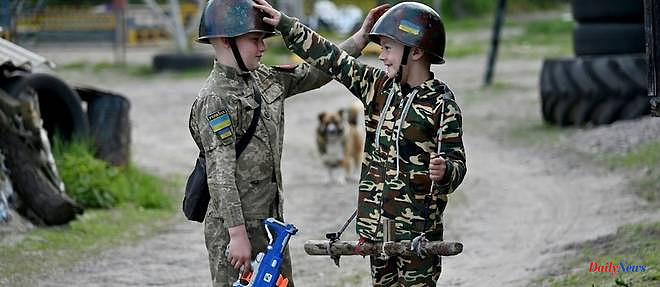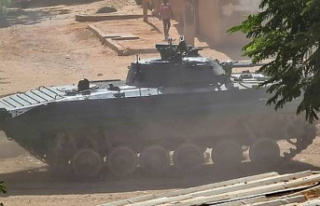Maksym and his friend are wearing old helmets and dummy guns that can't kill. But the war in which these two Ukrainian children are playing in a field, very real for them, is the reflection of traumas that will continue.
After 15 months of Russian invasion, the conflict is omnipresent in Ukrainian society, to the point of now invading children's games.
"I really like to play war. I want to grow up to become a real hero", assures the young Maksym Moudrak, 10, equipped with a combat fatigues at his waist, a dented helmet too big for him and a plastic gun.
His father, who was not a soldier, was killed near Kiev in the early days of the Russian invasion, while trying to help volunteer fighters who wanted to protect the capital.
"He was very, very affected by the death of his father. He thinks about him all the time. He goes to the cemetery and cries," his grandmother, 72-year-old Valentyna Moudrak, told AFP.
The little boy now wants to become a soldier, a way for him to preserve the memory of his father. And he has a clear idea of who is responsible for this war.
"The Russians are my worst enemies," says Maksym, who lives with his grandmother in Stoïanka, near kyiv.
The Russian invasion meant, for Ukrainian children, the loss of loved ones, the end of school and early exposure to the horrors of war.
According to UN figures, more than 500 children have died since February 24, 2022, when the Russian invasion began.
For psychologist Kateryna Goltsberg, "playing at war" for children is quite common in conflict zones and should above all be analyzed as a way for them to express their emotions and their feelings.
"War changes (the human being)", she told AFP, referring to "post-traumatic stress", inherent in shocks, but also the possibility that an individual "comes out stronger" from a such test.
In Ukraine, the fighting on the front line has thus found its extension in the playgrounds.
Lessya Chevtchenko, mother of 8-year-old Dana, says that before the war, her daughter had only one desire when she met other children: to play. "What's your name? Come on, let's play!" she would say.
But on a recent beach holiday in Bulgaria, Ms Shevchenko was stunned to hear her daughter asking other children where they were from.
And above all, when the latter replied that they were Russians, she would turn her back on them and leave without saying a word.
"I don't want to talk to them," Dana said. "Probably, because I think that in some way all Russians are evil."
Her mother, a 49-year-old dentist, says she didn't educate her to think that way. But the trauma is deep for the little girl who is now afraid of loud noises and dreads leaving the bomb shelters.
While Mrs. Shevchenko admits that some Russians may be opposed to the war in Ukraine, other parents are teaching their children that all Russians are responsible.
This is the case of Iryna Kovalenko. Her daughter Sofia, 6, sums up her feelings this way: "My mother told me that they were sending bombs to Ukraine from Russia. She also said that (Russian President Vladimir Putin) was very mean ".
The little one goes on without flinching: "He hit cats and dogs when he was a child. Now that he's grown up, he attacks adults".
By making such remarks to them and telling them this version of the war, Ms. Kovalenko, a 33-year-old nurse, claims to want to warn her children.
"One way or another, they have to know who lives on their doorstep. Ukraine will always have a border and Russia will always be our neighbor," she said.
In Maksym's group of little comrades, one of them seems particularly determined.
"I really want us to take our revenge for all the soldiers who died at the front," said one of them, Andriï Chyrokykh, 13, in combat gear.
The teenager says he dreams of becoming a soldier when he grows up. School no longer interests him, except to learn military strategy.
"I want to do to the Russians what they did to us," he says.
22/05/2023 07:43:58 - Kiev (Ukraine) (AFP) © 2023 AFP












